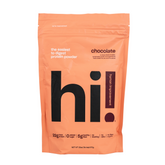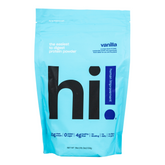Creatine is one of the most studied and validated supplements in the world. And while everyone always talks about its ability to support strength, power, and athletic performance, what’s often overlooked — even by health professionals — is that creatine isn’t just a “gym supplement.”
At Human Improvement, we’re all about helping humans improve — physically, mentally, and cellularly (yes, that’s a word now). Emerging research shows that its benefits extend far beyond the realm of physical performance — supporting everything from brain function to cellular health. That is why we say creatine is daily fuel for mind AND body improvement.
Here are five reasons everyone should consider taking creatine - that have nothing to do with the gym, backed by science and easy to understand.
1. Enhanced Brain Function 🧠
Creatine plays a vital role in cellular energy production — and that includes neurons. Your brain requires an immense amount of ATP (essentially your body’s battery power) to function properly, especially during periods of high mental demand.
What the research shows: Supplementation with creatine has been associated with improved working memory, faster cognitive processing, and reduced mental fatigue — particularly in sleep-deprived or cognitively stressed individuals.¹
Why it matters: Whether you’re tackling complex tasks or simply trying to stay sharp throughout the day, creatine can support cognitive resilience and performance.
2. Mood Boost & Mental Health ☀️
There is growing evidence linking creatine levels in the brain to emotional regulation and mental health. This is largely due to its impact on mitochondrial function and neurotransmitter synthesis.
What the research shows: Low brain creatine may be a factor in depression, and supplementation has been shown to support mood and potentially enhance the efficacy of certain antidepressant treatments.²
Why it matters: By improving cellular energy availability in the brain, creatine may help support emotional balance and mental well-being.
3. Support Healthy Aging 💪
As we age, both muscular and neurological creatine stores decline, which can contribute to loss of muscle mass, decreased cognitive function, and slower recovery.
What the research shows: Creatine supplementation has been shown to help mitigate sarcopenia (age-related muscle loss), improve functional strength, and support cognitive function in older adults.³
Why it matters: Creatine isn’t just a short-term performance tool — it’s a strategic investment in healthy aging.
4. Glucose Control & Metabolic Health 🩸
Creatine enhances glucose uptake in muscle cells by improving the expression and function of GLUT-4 transporters. This mechanism supports more efficient blood sugar regulation, especially when combined with regular physical activity.
What the research shows: Creatine has shown promise in improving glycemic control and insulin sensitivity, which are key markers for long-term metabolic health.⁴
Why it matters: Whether you’re managing blood sugar or aiming to reduce the risk of metabolic dysfunction, creatine may be a valuable part of your nutritional strategy.
5. Cellular Protection & Antioxidant Support 🧬
Oxidative stress contributes to cellular aging, inflammation, and mitochondrial dysfunction. Creatine appears to help buffer oxidative damage and preserve mitochondrial integrity, particularly in high-energy-demand tissues like the brain and muscles.
What the research shows: Studies suggest creatine may reduce markers of oxidative stress and enhance cellular defense mechanisms — potentially offering neuroprotective benefits in aging and neurodegenerative conditions.⁵
Why it matters: Creatine supports not just performance but cellular resilience at a foundational level.
Final Thoughts
While creatine is best known for its role in enhancing physical performance, its benefits clearly extend much further. From brain health and cell function to mood support and healthy aging, it’s one of the most versatile and evidence-based supplements available today.
We believe creatine = total human improvement and that’s why we created Performance Creatine. We use ultra-pure, micronized creatine monohydrate, rigorously 3rd party tested for quality and effectiveness but we didn’t stop there. We added MAX Catalyst, a piperine extract scientifically proven to enhance absorption by over 80% - delivering greater strength, sharper focus, and even more human improvement from every scoop.
Ready to try Performance Creatine now and see what you have been missing? Shop now.

References
1. Rae, C., Digney, A. L., McEwan, S. R., & Bates, T. C. (2003). Oral creatine monohydrate supplementation improves brain performance: a double–blind, placebo–controlled, cross–over trial. Proceedings of the Royal Society B: Biological Sciences, 270(1529), 2147–2150.
2. Roitman, S., Green, T., Osher, Y., Karni, N., Levine, J. (2007). Creatine monohydrate in resistant depression: a preliminary study. Journal of Clinical Psychiatry, 68(6), 938–940.
3. Candow, D. G., & Chilibeck, P. D. (2008). Potential of creatine supplementation for improving aging muscle health. Journal of Nutrition, Health & Aging, 12(5), 368–373.
4. Gualano, B., Ugrinowitsch, C., Novaes, R. B., Artioli, G. G., Shimizu, M. H., Seguro, A. C., & Lancha Jr, A. H. (2008). Creatine in type 2 diabetes: a randomized, double-blind, placebo-controlled trial. Medicine and Science in Sports and Exercise, 40(9), 1410–1415.
5. Sestili, P., Martinelli, C., Colombo, E., Barbieri, E., Potenza, L., Sartini, S., … & Fimognari, C. (2011). Creatine as an antioxidant. Amino Acids, 40(5), 1385–1396.









